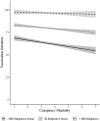Pro-vaccination subjective norms moderate the relationship between conspiracy mentality and vaccination intentions
- PMID: 34278666
- PMCID: PMC8420227
- DOI: 10.1111/bjhp.12550
Pro-vaccination subjective norms moderate the relationship between conspiracy mentality and vaccination intentions
Abstract
Objectives: Increasing vaccination hesitancy threatens societies' capacity to contain pandemics and other diseases. One factor that is positively associated with vaccination intentions is a supportive subjective norm (i.e., the perception that close others approve of vaccination). On the downside, there is evidence that negative attitudes toward vaccinations are partly rooted in conspiracy mentality (i.e., the tendency to believe in conspiracies). The objective of this study is to examine the role of subjective norms in moderating the association between conspiracy mentality and vaccine hesitancy. We examined two competing predictions: Are those high in conspiracy mentality immune to subjective norms, or do subjective norms moderate the relationship between conspiracy mentality and vaccination intentions?
Methods: We conducted five studies (total N = 1,280) to test these hypotheses across several vaccination contexts (some real, some fictitious). We measured conspiracy mentality, vaccination intentions, subjective norms, attitudes toward vaccination, and perceived behavioural control.
Results: A merged analysis across the studies revealed an interaction effect of conspiracy mentality and subjective norm on vaccination intentions. When subjective norm was high (i.e., when participants perceived that close others approved of vaccines) conspiracy mentality no longer predicted vaccination intentions. This was consistent with the moderating hypothesis of subjective norms and inconsistent with the immunity hypothesis.
Conclusions: The typical negative relationship between conspiracy mentality and vaccination intentions is eliminated among those who perceive pro-vaccination subjective norms. Although correlational, these data raise the possibility that pro-vaccination views of friends and family can be leveraged to reduce vaccine hesitancy.
Keywords: conspiracy mentality; subjective norm; theory of planned behaviour; vaccination.
© 2021 The Authors. British Journal of Health Psychology published by John Wiley & Sons Ltd on behalf of British Psychological Society.
Conflict of interest statement
All authors declare no conflict of interest.
Figures
References
-
- Ajzen, I. (1991). The theory of planned behavior. Organizational Behavior and Human Decision Processes, 50, 179–211. 10.1016/0749-5978(91)90020-T - DOI
-
- Banas, J. A. , & Miller, G. (2013). Inducing resistance to conspiracy theory propaganda: Testing inoculation and metainoculation strategies. Human Communication Research, 39, 184–207. 10.1111/hcre.12000 - DOI
-
- Cialdini, R. B. , Kallgren, C. A. , & Reno, R. R. (1991). A focus theory of normative conduct: A theoretical refinement and reevaluation of the role of norms in human behavior. Advances in Experimental Social Psychology, 24, 201–234.
Publication types
MeSH terms
LinkOut - more resources
Full Text Sources
Medical



